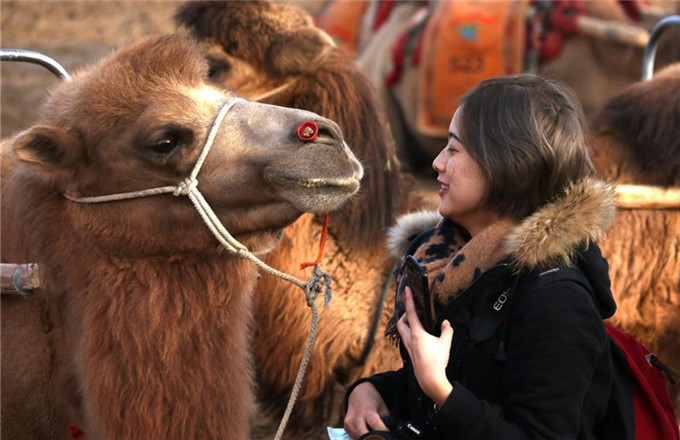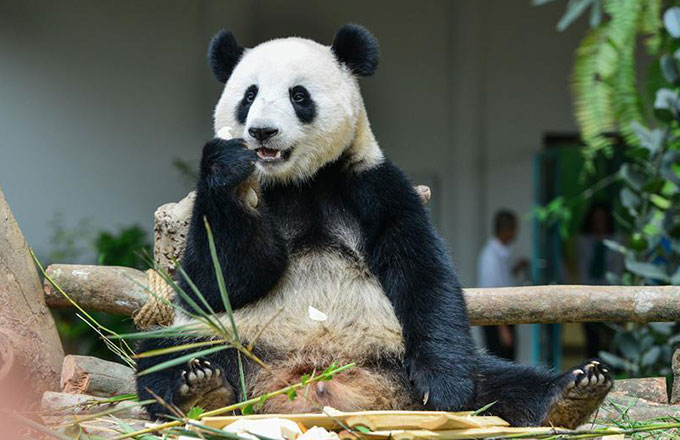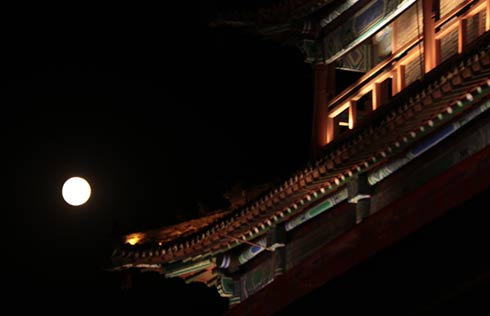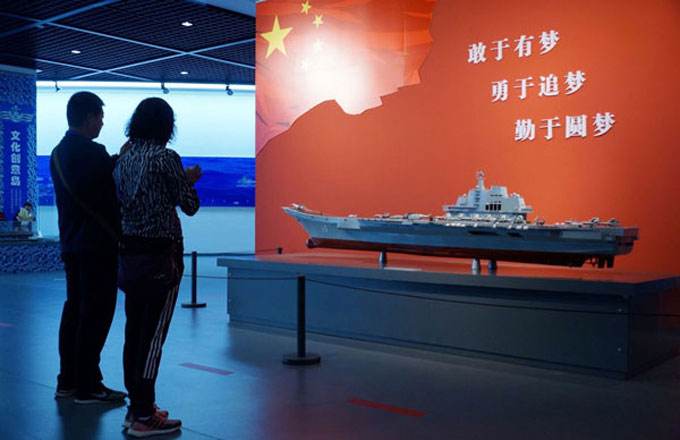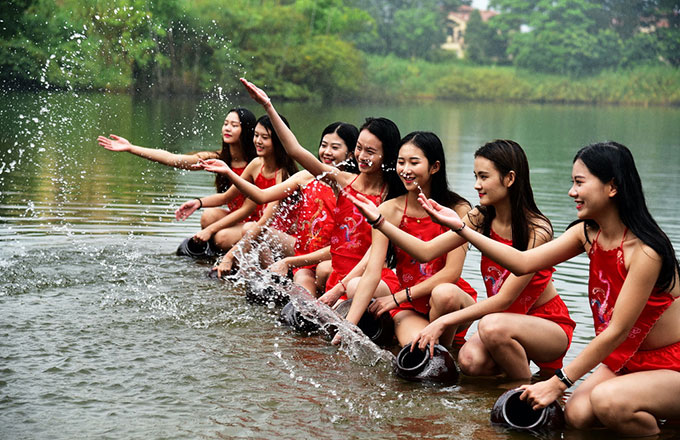Everything's coming up roses in Sanya
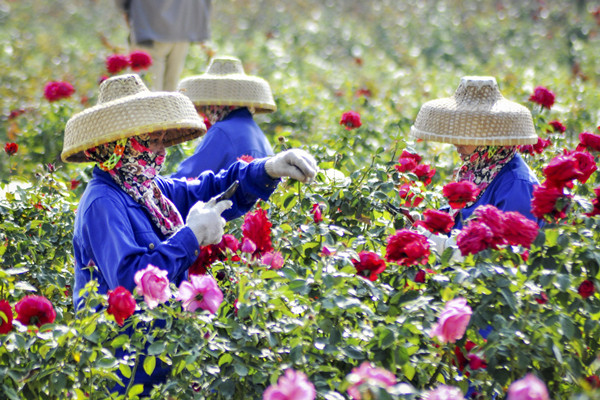 |
|
Farmers of the Li ethnic group trim plants at the rose valley in Sanya, Hainan province. CHINA DAILY |
As its landscape and hospitality features increasingly remind people of Hawaii and Dubai, a rose valley in Hainan province is emerging as an ecological and leisure lure that gives off a Claude Monet-style elegance and romance to the country's only tropical province.
Wearing a bamboo hat and scarf to shield herself from the scorching sun, Li Yumei, a mother of three children, and other local women carefully trim the rose plants that will begin to blossom in about a month at the Yalong Bay International Rose Valley in Sanya, at the southern tip of Hainan, which is building itself as an international tourist destination.
It is the spot President Xi Jinping visited some four years ago, where he donned a bamboo hat and posed for a photo with several women who work in the rose fields.
"I cherish the meeting with President Xi very much because since his visit to the rose valley on April 9, 2013, our life has been improving day by day. I was so excited seeing that President Xi was very concerned about our life that I involuntarily handed my bamboo hat to him when he came to talk to us in the field," said Li. This led to the well-known picture of Xi smiling with the group of women from the Li ethnic group.
That hat now hangs on the wall of Li's sitting room as a token of blessing.
Li and her husband now live a much easier life, with an annual income of more than 60,000 ($9,000) yuan from growing roses in the valley, which provides 50 million cut roses for the domestic market during the winter season.
This has led to growth in the tourist trade.
"We will soon recoup our investments of 2 million yuan. Room occupancy has never been a big concern since we started the family inn two years ago, because we have such a beautiful environment, with sweet rose gardens and a tropical rain forest park around us, and egrets dancing gracefully in the nearby wetlands," said Tan Zhongxian, owner of one of the 14 family inns in Bohou, a village of 925 households of the Li people where the rose valley is located.
About 1 kilometer from Yalong Bay-a popular national resort district where a dozen international five-star hotels neighbor each other-the fragrant rose valley has unfolded further romance for Sanya and yielded new fortune over the past four years. Villagers who used to make a living by growing rice, fishing and breeding poultry or by working outside as migrants now have upgraded living conditions and incomes and the local ecological and farming systems have improved.
"President Xi was keenly interested in our blossoming rose plants grown in the once alkaline soil and spoke highly of our business model," said Yang Ying, board chairwoman of the Hainan Rose Valley Industry Development Co Ltd, developer of the rose valley.
The company rented 184 hectares of farmland from local villagers in 2009 to grow roses, at a cost of 49,500 yuan per hectare and hired more than 500 villagers as workers. With support of local governments and agricultural scientists, the company has made great strides in conditioning the alkaline soil and experimenting to tame temperate roses so they can grow in tropical climates.
"He encouraged us to upgrade and industrialize our rose business, produce quality products, and develop tourism and take good care of the villagers' interests to reach common prosperity," said Yang, who accompanied Xi during his visit in 2013.
Xi's statements made while visiting the valley have brought about changes there.
With the support and leadership of the local government, the company has turned the once needy villages into a complex for rose-growing and processing, as well as tourism and the hospitality business with a theme of beauty, romance and love that is based on a rose culture.
The valley, now growing more than 200 varieties of roses, including the prestigious Damascus roses, began to open to tourists in 2014, attracting 1.3 million tourists and earning more than 260 million yuan from the sale of rose products and tourism last year, Yang said.
She said more than 2,000 jobs will be created as development of rose processing, family inns, logistics and tourism services speeds up.
Gao Zhengcai, Party chief of Damao, also a Li village near the valley, and head of one of the 18 rose-growing cooperatives, said growing the flowers has produced good returns for farmers. With an annual income of 160,000 yuan, Gao himself has bought two vehicles and has more than 1 million yuan in savings.
"We used to have no money, no cars and no decent houses. Now we have everything. I still remember that I made President Xi and the accompanying leaders laugh when I said growing roses is not easy and it is like taking care of a beauty," said Gao, adding that more neighbors are finding that growing roses is an attractive choice and are ready to join cooperatives.
The local government has spent 700 million yuan on infrastructure around the valley and is jointly introducing new business practices to generate more opportunities, highlighting the promotion of a rose culture and protection of traditional Li culture, local officials said.
"We will continue to enhance the rose valley as a tourism complex and a rose feature town, with a projected investment of 6 billion yuan in five years," said Yang of the development company, who started her career in Sanya after years of having a flower business in Shanghai. "We are leading tourists to the villages and are helping more farmers turn their extra houses into rose-culture-style rural inns for leisure tourism, yet with good protection of the Li lifestyle."
She said the company plans to develop the valley, the largest rose complex in Asia, into a world center of rose essence and fragrance and turn Sanya into a global rose trading center to promote exchanges and cooperation, especially with countries participating in the Belt and Road Initiative.
The company is expanding its growing areas of roses in other parts of Hainan, making new efforts to generate more added value from growing roses and developing in-depth rose processing and a rose culture to produce greater benefits for local people, Yang said.
She said, in cooperation with scientists from the Ministry of Science and expert teams from Taiwan, the company has developed 150 kinds of rose products under 38 series, such as rose wine brewing, cosmetics, rose cakes, rose tea and ornaments.
"We will highlight standardization management of our seedlings, agricultural material supply, growing and processing skills, branding and sales in a bid to produce quality products and build up our own brands," Yang said.
"I want to turn the rose valley into a fragrant Claude Monet-style garden," she said. A dream that is becoming an impressive reality.
- People find various ways to spend National Day holidays
- Anti-fraud centers in Guangdong prevent 79,000 people from being cheated
- 13 confirmed dead after Chinese fishing vessel collides with tanker
- Renovation of 1,000-year-old high school starts in east China
- Five bodies found in toppled Chinese fishing vessel






